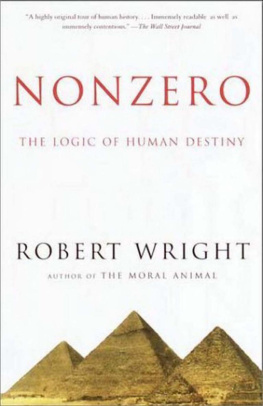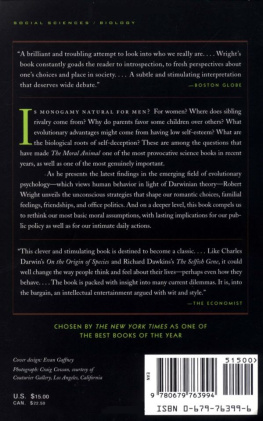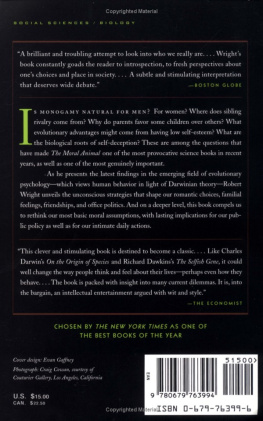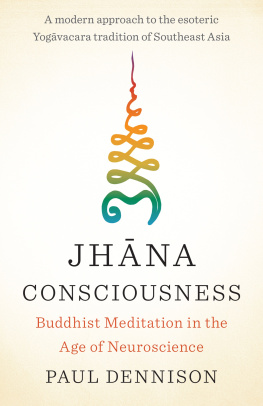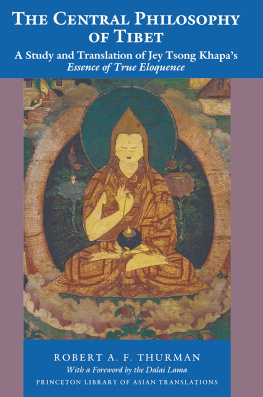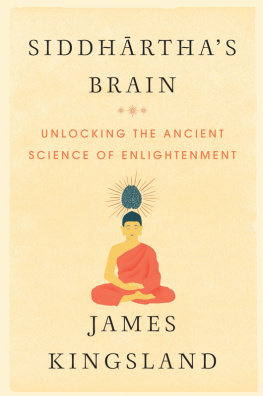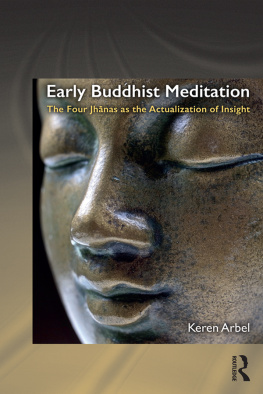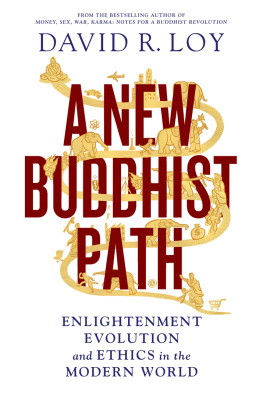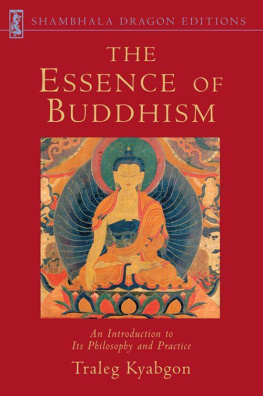Robert Wright - Why Buddhism is True - The Science and Philosophy of Meditation and Enlightenment
Here you can read online Robert Wright - Why Buddhism is True - The Science and Philosophy of Meditation and Enlightenment full text of the book (entire story) in english for free. Download pdf and epub, get meaning, cover and reviews about this ebook. year: 2016, publisher: Simon and Schuster, genre: Religion. Description of the work, (preface) as well as reviews are available. Best literature library LitArk.com created for fans of good reading and offers a wide selection of genres:
Romance novel
Science fiction
Adventure
Detective
Science
History
Home and family
Prose
Art
Politics
Computer
Non-fiction
Religion
Business
Children
Humor
Choose a favorite category and find really read worthwhile books. Enjoy immersion in the world of imagination, feel the emotions of the characters or learn something new for yourself, make an fascinating discovery.

- Book:Why Buddhism is True - The Science and Philosophy of Meditation and Enlightenment
- Author:
- Publisher:Simon and Schuster
- Genre:
- Year:2016
- Rating:4 / 5
- Favourites:Add to favourites
- Your mark:
- 80
- 1
- 2
- 3
- 4
- 5
Why Buddhism is True - The Science and Philosophy of Meditation and Enlightenment: summary, description and annotation
We offer to read an annotation, description, summary or preface (depends on what the author of the book "Why Buddhism is True - The Science and Philosophy of Meditation and Enlightenment" wrote himself). If you haven't found the necessary information about the book — write in the comments, we will try to find it.
Why Buddhism is True - The Science and Philosophy of Meditation and Enlightenment — read online for free the complete book (whole text) full work
Below is the text of the book, divided by pages. System saving the place of the last page read, allows you to conveniently read the book "Why Buddhism is True - The Science and Philosophy of Meditation and Enlightenment" online for free, without having to search again every time where you left off. Put a bookmark, and you can go to the page where you finished reading at any time.
Font size:
Interval:
Bookmark:
We hope you enjoyed reading this Simon & Schuster ebook.
Get a FREE ebook when you join our mailing list. Plus, get updates on new releases, deals, recommended reads, and more from Simon & Schuster. Click below to sign up and see terms and conditions.
CLICK HERE TO SIGN UP
Already a subscriber? Provide your email again so we can register this ebook and send you more of what you like to read. You will continue to receive exclusive offers in your inbox.
Thank you for downloading this Simon & Schuster ebook.
Get a FREE ebook when you join our mailing list. Plus, get updates on new releases, deals, recommended reads, and more from Simon & Schuster. Click below to sign up and see terms and conditions.
CLICK HERE TO SIGN UP
Already a subscriber? Provide your email again so we can register this ebook and send you more of what you like to read. You will continue to receive exclusive offers in your inbox.
ALSO BY ROBERT WRIGHT
The Evolution of God
Nonzero: The Logic of Human Destiny
The Moral Animal: Evolutionary Psychology and Everyday Life
Three Scientists and Their Gods: Looking for Meaning in an Age of Information


Simon & Schuster
1230 Avenue of the Americas
New York, NY 10020
www.SimonandSchuster.com
Copyright 2017 by Robert Wright
Lyrics to Feels Like the First Time by Foreigner reprinted courtesy of Michael L. Jones and Somerset Songs Publishing, Inc. Copyright 1977.
All rights reserved, including the right to reproduce this book or portions thereof in any form whatsoever. For information, address Simon & Schuster Subsidiary Rights Department, 1230 Avenue of the Americas, New York, NY 10020.
First Simon & Schuster hardcover edition August 2017
SIMON & SCHUSTER and colophon are registered trademarks of Simon & Schuster, Inc.
For information about special discounts for bulk purchases, please contact Simon & Schuster Special Sales at 1-866-506-1949 or .
The Simon & Schuster Speakers Bureau can bring authors to your live event. For more information or to book an event, contact the Simon & Schuster Speakers Bureau at 1-866-248-3049 or visit our website at www.simonspeakers.com.
Interior design by Ruth Lee-Mui
Jacket design by Pete Garceau
Jacket Art by Dinkoobraz/Getty Images Plus
Library of Congress Cataloging-in-Publication Data is available.
ISBN 978-1-4391-9545-1
ISBN 978-1-4391-9547-5 (ebook)
For Terri, Mike, Becki, and Linda
WRITER : | But tell me before you go. What was the worst thing about being down here? |
AGNES : | Just existing. Knowing my sight was blurred by my eyes, my hearing dulled by my ears, and my bright thought trapped in the grey maze of a brain. Have you seen a brain? |
WRITER : | And youre telling me thats whats wrong with us? How else can we be? |
A Dream Play by August Strindberg, as adapted by Caryl Churchill
A ny book with a title like Why Buddhism Is True should have some careful qualification somewhere along the way. We might as well get that over with:
1. Im not talking about the supernatural or more exotically metaphysical parts of Buddhismreincarnation, for examplebut rather about the naturalistic parts: ideas that fall squarely within modern psychology and philosophy. That said, I am talking about some of Buddhisms more extraordinary, even radical, claimsclaims that, if you take them seriously, could revolutionize your view of yourself and of the world. This book is intended to get you to take these claims seriously.
2. Im of course aware that theres no one Buddhism, but rather various Buddhist traditions, which differ on all kinds of doctrines. But this book focuses on a kind of common corefundamental ideas that are found across the major Buddhist traditions, even if they get different degrees of emphasis, and may assume somewhat different form, in different traditions.
3. Im not getting into super-fine-grained parts of Buddhist psychology and philosophy. For example, the Abhidhamma Pitaka, a collection of early Buddhist texts, asserts that there are eighty-nine kinds of consciousness, twelve of which are unwholesome. You may be relieved to hear that this book will spend no time trying to evaluate that claim.
4. I realize that true is a tricky word, and asserting the truth of anything, certainly including deep ideas in philosophy or psychology, is a tricky business. In fact, one big lesson from Buddhism is to be suspicious of the intuition that your ordinary way of perceiving the world brings you the truth about it. Some early Buddhist writings go so far as to raise doubts about whether such a thing as truth ultimately exists. On the other hand, the Buddha, in his most famous sermon, lays out what are commonly called The Four Noble Truths, so its not as if the word true has no place in discussions of Buddhist thought. In any event, Ill try to proceed with appropriate humility and nuance as I make my argument that Buddhisms diagnosis of the human predicament is fundamentally correct, and that its prescription is deeply valid and urgently important.
5. Asserting the validity of core Buddhist ideas doesnt necessarily say anything, one way or the other, about other spiritual or philosophical traditions. There will sometimes be logical tension between a Buddhist idea and an idea in another tradition, but often there wont be. The Dalai Lama has said, Dont try to use what you learn from Buddhism to be a better Buddhist; use it to be a better whatever-you-already-are.
Robert Wright

A t the risk of overdramatizing the human condition: Have you ever seen the movie The Matrix ?
Its about a guy named Neo (played by Keanu Reeves), who discovers that hes been inhabiting a dream world. The life he thought he was living is actually an elaborate hallucination. Hes having that hallucination while, unbeknownst to him, his actual physical body is inside a gooey, coffin-size podone among many pods, rows and rows of pods, each pod containing a human being absorbed in a dream. These people have been put in their pods by robot overlords and given dream lives as pacifiers.
The choice faced by Neoto keep living a delusion or wake up to realityis famously captured in the movies red pill scene. Neo has been contacted by rebels who have entered his dream (or, strictly speaking, whose avatars have entered his dream). Their leader, Morpheus (played by Laurence Fishburne), explains the situation to Neo: You are a slave, Neo. Like everyone else, you were born into bondage, into a prison that you cannot taste or see or toucha prison for your mind. The prison is called the Matrix, but theres no way to explain to Neo what the Matrix ultimately is. The only way to get the whole picture, says Morpheus, is to see it for yourself. He offers Neo two pills, a red one and a blue one. Neo can take the blue pill and return to his dream world, or take the red pill and break through the shroud of delusion. Neo chooses the red pill.
Thats a pretty stark choice: a life of delusion and bondage or a life of insight and freedom. In fact, its a choice so dramatic that youd think a Hollywood movie is exactly where it belongsthat the choices we really get to make about how to live our lives are less momentous than this, more pedestrian. Yet when that movie came out, a number of people saw it as mirroring a choice they had actually made.
Next pageFont size:
Interval:
Bookmark:
Similar books «Why Buddhism is True - The Science and Philosophy of Meditation and Enlightenment»
Look at similar books to Why Buddhism is True - The Science and Philosophy of Meditation and Enlightenment. We have selected literature similar in name and meaning in the hope of providing readers with more options to find new, interesting, not yet read works.
Discussion, reviews of the book Why Buddhism is True - The Science and Philosophy of Meditation and Enlightenment and just readers' own opinions. Leave your comments, write what you think about the work, its meaning or the main characters. Specify what exactly you liked and what you didn't like, and why you think so.

